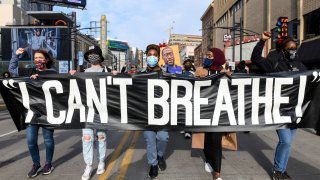
- "They did not do any damage," Civil Rights attorney David Henderson told CNBC's "The News with Shepard Smith."
- Henderson explained that instead of focusing of the medical details, the Chauvin defense team failed to seize an "in" that Tobin gave them during testimony.
Former police officer Derek Chauvin's lawyers took the wrong approach when cross-examining the prosecution's expert witness, Civil Rights attorney David Henderson said Thursday.
"They did not do any damage," Henderson told CNBC's "The News with Shepard Smith." "You don't try to arm wrestle with a gorilla. This doctor is very clearly qualified, he knows more than you do about medical stuff."
Get a weekly recap of the latest San Francisco Bay Area housing news. Sign up for NBC Bay Area’s Housing Deconstructed newsletter.
Dr. Martin Tobin, the prosecution's expert medical witness, is a renowned pulmonary specialist who works in critical care. He concluded that "Floyd died from a low level of oxygen." Tobin's testimony came on the ninth day of Chauvin's murder trial.
Chauvin's defense attorney, Eric Nelson, suggested Tobin's report captured only a small portion of what happened during George Floyd's arrest last May.
Henderson explained that instead of focusing of the medical details, the Chauvin defense team failed to seize an "in" that Tobin gave them during testimony.
Money Report
The Chicago-based physician said there were four key factors that contributed to Floyd's asphyxia. He said Floyd was "turned prone on the street, that he has the handcuffs in place combined with the street, that he has a knee on his neck, and he has a knee on his back and on his side."
Henderson added that Chauvin's knee on Floyd's neck was only one of those factors.
"There are three other factors, given that Derek Chauvin's knee has to be the substantial contributing factor, that's what you should have cross-examined on," Henderson said. "There are three other ways that might have caused George Floyd's death that aren't directly attributable to [Chauvin]."
Henderson, a former prosecutor and CNBC contributor, also said Tobin effectively "squashed" the defense's contention that drugs — especially fentanyl — could have caused George Floyd's death.
Chauvin's defense team did not immediately respond to CNBC's request for comment.






